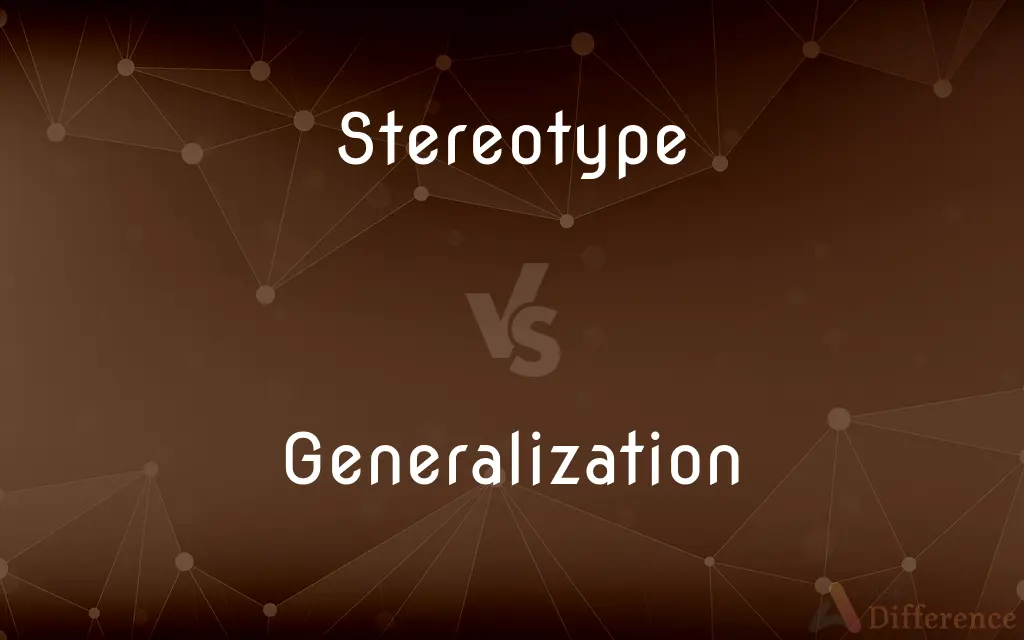Stereotype vs. Generalization — What's the Difference?
Edited by Tayyaba Rehman — By Fiza Rafique — Updated on March 8, 2024
Stereotypes are oversimplified ideas about a group, often negative and based on assumptions, whereas generalizations are broader, neutral conclusions drawn from observations.

Difference Between Stereotype and Generalization
Table of Contents
ADVERTISEMENT
Key Differences
Stereotypes often emerge from a desire to simplify complex human behaviors or characteristics into easily understandable categories. They rely heavily on preconceived notions and biases, leading to potentially harmful misrepresentations. Generalizations, on the other hand, are formed by identifying common traits or behaviors in a group, based on evidence or experience, and can be adjusted as new information becomes available.
While stereotypes can contribute to prejudices and discriminatory practices by assuming all individuals in a group share the same negative traits, generalizations serve a cognitive function by helping people make sense of patterns or trends within the world around them, though they must be applied with caution to avoid inaccuracies.
Stereotypes are less flexible and often resist change, even in the face of contradictory evidence. They are typically passed down through cultural or societal norms and can be deeply ingrained in individual belief systems. Conversely, generalizations are more adaptable and open to revision as they are based on ongoing observations and can be refined over time with additional data.
The use of stereotypes can lead to social and emotional harm for those who are stereotyped, reinforcing societal divisions and inequalities. Generalizations, while potentially useful for understanding broad patterns, must be critically evaluated and used responsibly to prevent the perpetuation of stereotypes.
Understanding the distinction between stereotypes and generalizations is crucial for navigating social interactions and cultural understanding. Recognizing the limitations and potential harm of stereotypes encourages more thoughtful and accurate representations of individuals and groups, whereas responsibly made generalizations can facilitate learning and adaptation.
ADVERTISEMENT
Comparison Chart
Basis
Preconceived notions, biases
Observations, experiences
Flexibility
Rigid, resistant to change
Adaptable, open to revision
Potential for Harm
High, can lead to discrimination and prejudice
Lower, but can still perpetuate inaccuracies
Application
Often applied without evidence, based on societal norms
Based on evidence, can be refined with new information
Role in Communication
Can hinder effective communication by promoting false assumptions
Can aid in understanding broad trends or patterns
Compare with Definitions
Stereotype
A belief that associates a group of people with certain traits.
The stereotype of the lazy employee overlooks individual contributions.
Generalization
Generalizations can be refined with new observations or data.
Initial generalizations about internet usage have evolved with technology.
Stereotype
An oversimplified and fixed image of all members of a culture or group.
The stereotype that all teenagers are rebellious can lead to unfair treatment.
Generalization
An inference that applies broad characteristics to individuals within a group.
Making a generalization about dietary habits can overlook cultural nuances.
Stereotype
Stereotypes are resistant to change due to their basis in cultural norms.
Gender stereotypes continue to affect career choices.
Generalization
A tool for understanding patterns in human behavior or characteristics.
Generalizations about consumer behavior help businesses target their markets.
Stereotype
A stereotype can perpetuate negative and unfounded prejudices.
Racial stereotypes can cause significant societal harm.
Generalization
A conclusion drawn from observing common characteristics among a group.
The generalization that birds fly does not account for exceptions like ostriches.
Stereotype
Stereotypes can be both positive and negative, though often harmful.
The stereotype of the tech-savvy youth excludes many from older generations.
Generalization
While useful, generalizations require critical examination to avoid inaccuracies.
Generalizations about climate change impacts guide but also need specificity.
Stereotype
In social psychology, a stereotype is a generalized belief about a particular category of people. It is an expectation that people might have about every person of a particular group.
Generalization
A generalization is a form of abstraction whereby common properties of specific instances are formulated as general concepts or claims. Generalizations posit the existence of a domain or set of elements, as well as one or more common characteristics shared by those elements (thus creating a conceptual model).
Stereotype
A relief printing plate cast in a mould made from composed type or an original plate.
Generalization
The act or an instance of generalizing.
Stereotype
View or represent as a stereotype
The city is too easily stereotyped as an industrial wasteland
Generalization
A principle, statement, or idea having general application.
Stereotype
A conventional, formulaic, and oversimplified conception, opinion, or image.
Generalization
An act or instance of generalizing; concluding that something true of a subclass is true of the entire class
Stereotype
One that is regarded as embodying or conforming to a set image or type.
Generalization
The formulation of general concepts from specific instances by abstracting common properties.
Stereotype
(Printing) A metal printing plate cast from a matrix molded from a raised printing surface, such as type.
Generalization
Inductive reasoning from detailed facts to general principles
Stereotype
To make a stereotype of.
Generalization
An oversimplified or exaggerated conception, opinion, or image of the members of a group.
Stereotype
To characterize by a stereotype
"Elderly Americans are the neglected sector of the fashion industry, stereotyped by blue hair and polyester pantsuits" (American Demographics).
Generalization
(mathematics) A proof, axiom, problem, or definition that includes another's cases, and also some additional cases; a conclusion reached by inferring from specific cases to more general cases or principles.
A hypersphere is a generalization of a sphere across more than three dimensions.
Stereotype
To give a fixed, unvarying form to.
Generalization
The act or process of generalizing; the act of bringing individuals or particulars under a genus or class; deduction of a general principle from particulars.
Generalization is only the apprehension of the one in the many.
Stereotype
To print from a stereotype.
Generalization
A general inference.
Stereotype
A conventional, formulaic, and often oversimplified or exaggerated conception, opinion, or image of (a person or a group of people).
Generalization
The process of formulating general concepts by abstracting common properties of instances
Stereotype
(psychology) A person who is regarded as embodying or conforming to a set image or type.
Generalization
Reasoning from detailed facts to general principles
Stereotype
(printing) A metal printing plate cast from a matrix moulded from a raised printing surface.
Generalization
An idea having general application;
He spoke in broad generalities
Stereotype
(software engineering) An extensibility mechanism of the Unified Modeling Language, allowing a new element to be derived from an existing one with added specializations.
Generalization
(psychology) transfer of a response learned to one stimulus to a similar stimulus
Stereotype
(transitive) To make a stereotype of someone or something, or characterize someone by a stereotype.
Stereotype
To prepare for printing in stereotype; to produce stereotype plates of.
To stereotype the Bible
Stereotype
To print from a stereotype.
Stereotype
To make firm or permanent; to fix.
Stereotype
A plate forming an exact faximile of a page of type or of an engraving, used in printing books, etc.; specifically, a plate with type-metal face, used for printing.
Stereotype
The art or process of making such plates, or of executing work by means of them.
Stereotype
To prepare for printing in stereotype; to make the stereotype plates of; as, to stereotype the Bible.
Stereotype
Fig.: To make firm or permanent; to fix.
Powerful causes tending to stereotype and aggravate the poverty of old conditions.
Stereotype
A conventional or formulaic conception or image;
Regional stereotypes have been part of America since its founding
Stereotype
Treat or classify according to a mental stereotype;
I was stereotyped as a lazy Southern European
Common Curiosities
What is a generalization?
A generalization is a broad statement or conclusion drawn from observing trends or patterns, applicable to a group but with room for exceptions.
Are all generalizations harmful?
Not all generalizations are harmful; they can be useful in understanding trends but should be used cautiously to avoid perpetuating inaccuracies.
How do stereotypes affect individuals?
Stereotypes can lead to prejudice, discrimination, and social exclusion, affecting individuals' mental health and opportunities.
How can one avoid stereotyping?
Avoiding stereotyping involves critical thinking, seeking individual experiences, and challenging preconceived notions or biases.
How do stereotypes and generalizations differ?
Stereotypes are rigid and often negative assumptions about a group, while generalizations are broader, more neutral conclusions drawn from observations.
Can stereotypes ever be positive?
While stereotypes can be positive, they still promote a simplified and often inaccurate view of a group, which can be limiting or harmful.
Why are stereotypes resistant to change?
Stereotypes are resistant to change because they are deeply ingrained in cultural norms and societal structures.
What is a stereotype?
A stereotype is an oversimplified, fixed idea or belief about a particular group of people, often based on assumptions rather than facts.
Why do people use stereotypes?
People use stereotypes as a cognitive shortcut to simplify the complexity of the social world, though it often leads to inaccuracies.
Can generalizations be useful?
Yes, generalizations can be useful in making sense of common patterns or trends, as long as they are critically evaluated and open to revision.
How can we challenge stereotypes?
Challenging stereotypes involves education, exposure to diverse perspectives, and promoting more accurate and nuanced representations.
Are generalizations always accurate?
Generalizations are not always accurate; they are starting points for understanding that need refinement and critical examination.
Can generalizations lead to stereotypes?
Yes, if generalizations are applied too rigidly or without critical examination, they can evolve into stereotypes.
How do stereotypes differ from prejudices?
Stereotypes are oversimplified beliefs about a group, while prejudices involve preconceived opinions or feelings, often negative, towards individuals based on their membership in that group.
What role does culture play in stereotypes?
Culture significantly influences stereotypes, as they are often rooted in societal norms, media representations, and historical contexts.
Share Your Discovery

Previous Comparison
Cat vs. Rat
Next Comparison
Material vs. IngredientAuthor Spotlight
Written by
Fiza RafiqueFiza Rafique is a skilled content writer at AskDifference.com, where she meticulously refines and enhances written pieces. Drawing from her vast editorial expertise, Fiza ensures clarity, accuracy, and precision in every article. Passionate about language, she continually seeks to elevate the quality of content for readers worldwide.
Edited by
Tayyaba RehmanTayyaba Rehman is a distinguished writer, currently serving as a primary contributor to askdifference.com. As a researcher in semantics and etymology, Tayyaba's passion for the complexity of languages and their distinctions has found a perfect home on the platform. Tayyaba delves into the intricacies of language, distinguishing between commonly confused words and phrases, thereby providing clarity for readers worldwide.














































